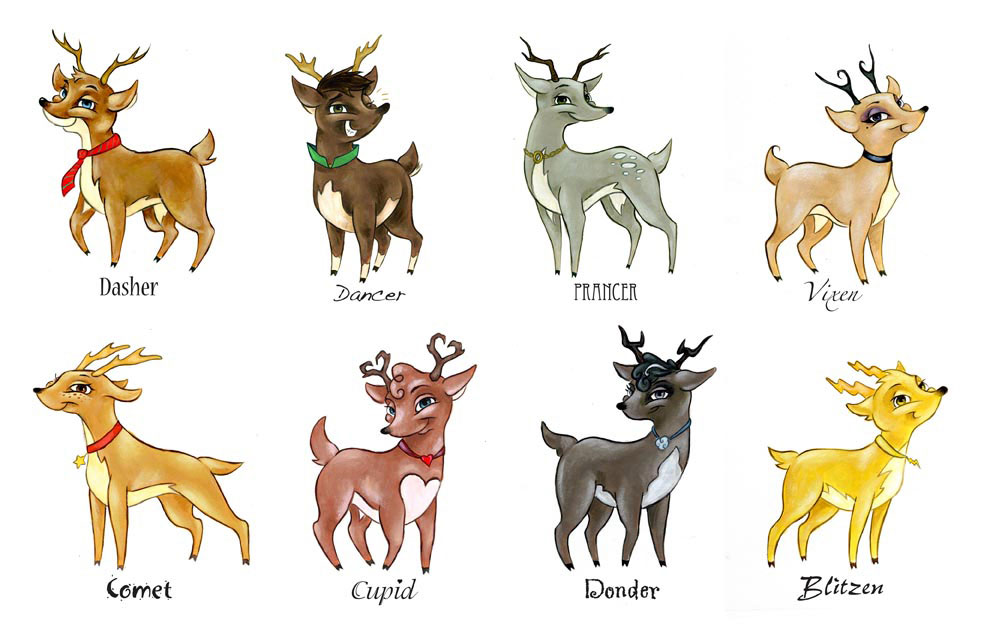The holiday season is a time filled with joy, magic, and cherished traditions, and one of the most beloved figures in this season is Santa Claus and his eight reindeer. These mythical creatures have become icons of Christmas lore, captivating the hearts of children and adults alike. In this article, we will explore the names of Santa's eight reindeer, their origins, and their significance in holiday celebrations around the world.
Understanding the names of the eight reindeer offers insight into the beautiful story of Santa Claus and how these reindeer have become integral to Christmas traditions. The reindeer are not just animals; they represent the spirit of giving, joy, and the magic associated with the holiday season. As we delve deeper into their names and characteristics, we will also touch upon how they have influenced modern Christmas celebrations.
Join us as we embark on this festive exploration, uncovering the names of the eight reindeer and the enchanting tales that bring them to life. Whether you are a holiday enthusiast or simply curious about the origins of these iconic figures, this article promises to be both informative and delightful.
Table of Contents
- The Reindeer Names
- Origin of the Reindeer
- Characteristics of the Reindeer
- Cultural Significance
- The Reindeer in Modern Culture
- Fun Facts About the Reindeer
- The Reindeer in Children’s Literature
- Conclusion
The Reindeer Names
According to the classic poem “A Visit from St. Nicholas,” also known as “The Night Before Christmas,” the names of Santa’s eight reindeer are:
- Dasher
- Dancer
- Prancer
- Vixen
- Comet
- Cupid
- Donner
- Blitzen
Each reindeer has its own unique personality, reflecting their names. For instance, Dasher is known for his speed, while Dancer embodies grace. Understanding these names enriches the story of Santa and his magical journey on Christmas Eve.
Origin of the Reindeer
The origins of these reindeer can be traced back to folklore and mythology. The concept of flying reindeer was popularized in the 19th century, particularly through the poem mentioned above. The names themselves have roots in German and Dutch languages, reflecting the cultural influences of the time.
Many believe that the idea of Santa’s reindeer was inspired by ancient Norse mythology, where a god called Odin would ride through the sky on a flying horse, accompanied by magical creatures. This blend of mythology and tradition laid the groundwork for the modern portrayal of Santa Claus and his reindeer.
Characteristics of the Reindeer
Each of Santa’s reindeer has distinctive traits that align with their names. Here’s a brief overview of their characteristics:
- Dasher: Fast and energetic, known for leading the team.
- Dancer: Graceful and agile, adds elegance to the flight.
- Prancer: Proud and confident, known for his joyful spirit.
- Vixen: Sassy and clever, often seen as the mischievous one.
- Comet: Bright and shining, symbolizes hope and joy.
- Cupid: Romantic and affectionate, represents love.
- Donner: Strong and powerful, signifies strength and resilience.
- Blitzen: Quick and lightning-fast, embodies excitement and energy.
Cultural Significance
Across various cultures, the reindeer have taken on different meanings and representations. In some traditions, they symbolize the spirit of generosity and the importance of giving during the holiday season.
In countries like Norway and Sweden, reindeer are a significant part of Christmas celebrations, often depicted in decorations and stories. The image of Santa and his reindeer has become a universal symbol of Christmas, transcending borders and languages.
The Reindeer in Modern Culture
Today, the eight reindeer are featured prominently in modern Christmas culture, from movies and television shows to decorations and holiday merchandise. They have become staples of Christmas storytelling, often depicted in various forms of media that celebrate the holiday spirit.
Many families incorporate the reindeer into their holiday traditions, whether by reading classic Christmas stories or setting up decorations that feature these magical creatures. The reindeer have become synonymous with the joy and wonder of the Christmas season.
Fun Facts About the Reindeer
Here are some fun and interesting facts about Santa's reindeer:
- The names “Donner” and “Blitzen” are derived from the German words for “thunder” and “lightning,” respectively.
- In some versions of the story, there is a ninth reindeer named Rudolph, who is known for his glowing red nose.
- The reindeer are often depicted as being able to fly, a feature that adds to their magical appeal.
- Reindeer are real animals native to the Arctic and subarctic regions, often associated with the winter season.
The Reindeer in Children’s Literature
The eight reindeer have also made their mark in children’s literature, inspiring countless stories and books. From classic tales to modern adaptations, these characters continue to enchant young readers and contribute to the magic of Christmas.
Books like “Rudolph the Red-Nosed Reindeer” and “The Night Before Christmas” have become holiday staples, bringing the stories of Santa’s reindeer to life for new generations. These tales emphasize themes of friendship, courage, and the joy of giving, making them perfect for the holiday season.
Conclusion
In conclusion, the names of the eight reindeer—Dasher, Dancer, Prancer, Vixen, Comet, Cupid, Donner, and Blitzen—are more than just names; they embody the spirit of Christmas and the joy of the holiday season. Understanding their origins and characteristics enriches our appreciation for these magical creatures and their role in holiday traditions.
As we celebrate the holidays, let us remember the significance of giving and the joy that Santa and his reindeer bring to our lives. We invite you to share your thoughts in the comments below, and don’t forget to spread the holiday cheer by sharing this article with others who might enjoy it!
Thank you for joining us on this festive journey, and we hope to see you again for more delightful explorations into holiday traditions and stories.
Pictures Of Dead Princess Diana: A Reflection On Tragedy And Legacy
Dr. Doug Weiss And Joni Lamb: A Journey Of Healing And Hope
Tony Evans Steps Down: Why Did It Happen?


